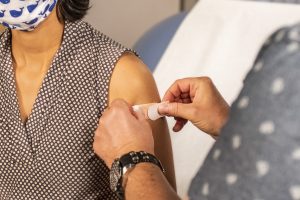
For Dr. Luciana Garbayo, assistant professor of philosophy and medical education, the COVID-19 pandemic is more than a public health crisis — it’s an opportunity to engage in an ethical dialogue about public health with the community. As a professor with a joint appointment in the College of Arts and Humanities and the College of Medicine, she is well-versed in the interweaving of the two disciplines.
When it comes to the ethical debate surrounding mask and vaccine mandates, Dr. Garbayo finds similarities in other public health requirements, such as the notion that we must all follow the rules of the road while driving. In this example, the driver’s positive liberty to seek resources to improve the odds of surviving traffic accidents — choosing to wear a seatbelt as a safety device — supports public safety for oneself and everyone. To drive without a seat belt, while enhancing one’s negative liberty not to be constrained, does not improve safety neither for the driver, nor for the public. It is in every driver’s self-interest to use a seatbelt as well as in the community’s best interest.
“It’s not about punishment as much as it’s about understanding the value that you’re producing with your actions,” says Dr. Garbayo. “If we reflect a little, we can feel comforted that we are doing good by learning to navigate in ways that protect ourselves and others.”
Alongside her work at UCF, Dr. Garbayo serves on the advisory board of the Florida Bioethics Network. This network of experts housed in the University of Miami provides leadership within the bioethical and medicine communities, both to educators and the public. This fall, the network crafted a Statement on COVID-19 Duties, which the UCF Department of Philosophy has voted to endorse.
In addition to recognizing that wearing masks and obtaining vaccinations are moral obligations in the fight against COVID-19, the statement highlights the importance of community debate, stating that such debate over public health goals, options and the balancing of rights and privileges will build understanding and trust in the public health mission.
“Ethics is about engaging authentically in constructive conversations on what we value, and how we should recognize each other in our community,” explains Dr. Garbayo. “It’s really time for people to come together. We need this engagement so that we can avoid false moral equivalencies regarding our understanding of the distribution of burdens and harms. Further, we can recognize the necessary protections and support for everybody’s freedoms within the challenging context of a pandemic.”
The Florida Bioethics Network’s statement also highlights the need for intentional outreach to marginalized and vulnerable communities who may have less access to — or greater hesitancy toward — testing programs and vaccines.
“The real issue is health equity, in the sense of making sure that everybody has access [to the vaccine],” says Dr. Garbayo. “We need more expertise on reaching people and providing them the resources for their positive liberties to be enhanced.”
All in all, Dr. Garbayo is hopeful that continued dialogue around the ethics of mask and vaccine mandates will have a positive impact on public health, encouraging us come together to fight the pandemic in the way most aligned with our ethical standards rather than sowing further discord.
“We have to recognize the public sphere and engage,” explains Dr. Garbayo. “It’s part of our civic duty to enter in a dialogue and expose the reasons and justifications [behind mask and vaccine mandates]. It’s about engaging positively and constructively with the community. It’s okay to disagree; people shouldn’t feel bad. They should just try to get informed on the resources available for everyone’s protection under a pandemic.”
